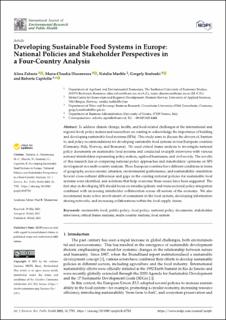| dc.contributor.author | Zaharia, Alina | |
| dc.contributor.author | Diaconeasa, Maria Claudia | |
| dc.contributor.author | Mæhle, Natalia | |
| dc.contributor.author | Szolnoki, Gergely | |
| dc.contributor.author | Capitello, Roberta | |
| dc.date.accessioned | 2021-10-11T10:34:14Z | |
| dc.date.available | 2021-10-11T10:34:14Z | |
| dc.date.created | 2021-09-28T13:17:12Z | |
| dc.date.issued | 2021 | |
| dc.identifier.citation | Zaharia, A., Diaconeasa, M.-C., Maehle, N., Szolnoki, G., & Capitello, R. (2021). Developing Sustainable Food Systems in Europe: National Policies and Stakeholder Perspectives in a Four-Country Analysis. International Journal of Environmental Research and Public Health, 18(14), 7701. | en_US |
| dc.identifier.issn | 1661-7827 | |
| dc.identifier.uri | https://hdl.handle.net/11250/2788989 | |
| dc.description.abstract | To address climate change, health, and food-related challenges at the international and regional level, policy makers and researchers are starting to acknowledge the importance of building and developing sustainable food systems (SFSs). This study aims to discuss the drivers of, barriers to, and policy recommendations for developing sustainable food systems in four European countries (Germany, Italy, Norway, and Romania). We used critical frame analysis to investigate national policy documents on sustainable food systems and conducted in-depth interviews with various national stakeholders representing policy makers, agrifood businesses, and civil society. The novelty of this research lies in comparing national policy approaches and stakeholders’ opinions on SFS development in a multi-country analysis. These European countries have different conditions in terms of geography, socioeconomic situation, environmental performance, and sustainability orientation. Several cross-cultural differences and gaps in the existing national policies for sustainable food systems were identified, and solutions that help overcome these issues have been suggested. The first step in developing SFS should focus on interdisciplinary and trans-sectorial policy integration combined with increasing stakeholder collaboration across all sectors of the economy. We also recommend more active involvement of consumers in the food system, developing information-sharing networks, and increasing collaborations within the food supply chains. | en_US |
| dc.language.iso | eng | en_US |
| dc.publisher | MDPI | en_US |
| dc.rights | Navngivelse 4.0 Internasjonal | * |
| dc.rights.uri | http://creativecommons.org/licenses/by/4.0/deed.no | * |
| dc.title | Developing Sustainable Food Systems in Europe: National Policies and Stakeholder Perspectives in a Four-Country Analysis | en_US |
| dc.type | Peer reviewed | en_US |
| dc.type | Journal article | en_US |
| dc.description.version | publishedVersion | en_US |
| dc.rights.holder | © 2021 by the authors. | en_US |
| dc.source.volume | 18 | en_US |
| dc.source.journal | International Journal of Environmental Research and Public Health (IJERPH) | en_US |
| dc.source.issue | 14 | en_US |
| dc.identifier.doi | 10.3390/ijerph18147701 | |
| dc.identifier.cristin | 1939784 | |
| dc.relation.project | Norges forskningsråd: 284505 | en_US |
| dc.source.articlenumber | 7701 | en_US |
| cristin.ispublished | true | |
| cristin.fulltext | original | |
| cristin.qualitycode | 1 | |

